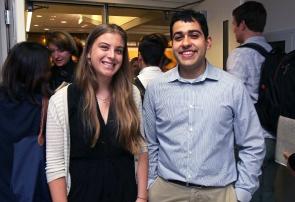A Positive SPIN
New Student Group Strengthens Growing Public Interest Community at Columbia Law School
New York, November 6, 2014—Students looking to pursue a career or pro bono work in public interest law can choose among a dizzying array of offerings at Columbia Law School. There are international internships, domestic internships, externships, and various clinics covering everything from environmental law to immigration. Not to mention the student-run activities, faculty-led research, and myriad panel discussions.
But a new group, the Student Public Interest Network (SPIN), is making all those opportunities more navigable, in part by uniting student organizations devoted to public interest work under one umbrella with a monthly forum designed to foster collaboration and priority setting.
| Kirby B. Tyrrell '16, left, and Paul Chander '15 are the founders of the Student Public Interest Network (SPIN), a new student group. |
At SPIN’s most recent general meeting, Paul Chander ’15, one of the group’s founders and co-chairs, described the organization’s history.
“So, SPIN started last semester…” he began, pausing for effect and prompting laughter among his first-, second-, and third-year classmates who packed into a classroom to learn more about public interest work at Columbia Law School. “It’s true; we’re not very old.”
Which is precisely what makes SPIN’s many accomplishments so far all the more impressive. Since it was founded last spring, SPIN has facilitated:
- a leadership retreat to upstate New York;
- an orientation program designed to introduce incoming first-year students to public interest life at the Law School;
- social events and happy hours;
- outreach with advocacy-oriented faculty;
- peer mentoring; and
- panel discussions with young alumni in government and nonprofit positions.
In just a semester-and-a-half, the organization has tapped into a rich vein of already-existing public interest programming, career counseling, and pro bono opportunities at Columbia Law School, adding significant value—and enthusiasm.
SPIN works closely with Social Justice Initiatives and the Office of Student Services to make sure its offerings are complementary and provides something only a student-led group can: a sense of ownership and camaraderie.
“SPIN's commitment to being inclusive and representative of all public interest students and their organizations—and its collegiality with administrators and faculty members—means that it has been able to foster substantial community and discussions at the Law School,” said Dean for Social Justice Initiatives Ellen P. Chapnick. “I am thrilled that SJI and its staff members, particularly Maddie Kurtz, have been able to support and collaborate with SPIN. I look forward to seeing what it does next.”
For its monthly forum, called the SPIN Network, SPIN gathers representatives from other public interest student groups—including the ACLU, the Black Law Students Association, Columbia Law Women’s Association, and more than 20 others—for candid conversations about what’s happening around campus. SPIN also has been very effective in its outreach and community building efforts. Members run a blog as well as Twitter and Facebook accounts, and the group has delegated oversight of its many activities to student leaders on a robust board for the 2014-2015 year.
“SPIN hopes to act as a support system, a social community, and a student/alumni network for all public interest law students across all issues,” Chander said. “We also hope to provide an institutional platform for students to advocate for public interest law throughout the Law School and the broader legal community.”
Kirby B. Tyrrell ’16, Chander’s co-chair, said SPIN has 115 members so far.
“Students feel like they have a community, and they feel supported in their professional interests and developments,” she said. “It has been really exciting.”
The idea behind SPIN grew out of a class Chander and Tyrrell took with Columbia Law School Professor Susan Sturm called Lawyering for Change.
“The class really gets students to think systematically about theories of change,” Chander said. “Professor Sturm inspired me to apply those theories to our own community.”
SPIN partnered with Sturm earlier this month to host an event in which several faculty shared advice on how students can become involved in advocacy work.
Before founding SPIN, Chander and other students met with administrators, professors, and classmates to see how they could best serve the needs of Columbia Law School’s public interest community. The group welcomes everyone—its membership is open to anyone with an interest in social justice, even if he or she plans to work at a corporation or law firm after graduation.
“SPIN defines ‘public interest law’ broadly, including an interest in working in a nonprofit, the government, an international organization, or a for-profit institution that substantially does public interest work, at any point in a career,” Chander said. “In the real world, lawyers often move between the public and private sectors and work together to advance social justice.”
Thanks to SPIN and other like-minded efforts, Columbia Law School students do too.
